John Janaro's Blog, page 45
October 16, 2023
When We Lose Someone to Suicide, the Wound Remains…
 Below is a poem that I wrote over a decade ago and that has appeared on this blog before. I don’t know what to say about it, really. I know that on a beautiful October day, 18 years ago, I learned of the tragic death of a very special friend—a friend from a family that has been close to our family for three generations. He had visited us with his brother fairly recently, and we knew that his depression had turned in a dangerous direction (though apparently he was able to hide it from people in general).
Below is a poem that I wrote over a decade ago and that has appeared on this blog before. I don’t know what to say about it, really. I know that on a beautiful October day, 18 years ago, I learned of the tragic death of a very special friend—a friend from a family that has been close to our family for three generations. He had visited us with his brother fairly recently, and we knew that his depression had turned in a dangerous direction (though apparently he was able to hide it from people in general). His depression was different (and much more severe) than anything I have suffered in my “constellation” of mental illnesses over the years. He was very sick. We knew he was struggling, and that there was a danger… but who imagines that these things can really happen?
This seems like it was a long time ago, and I have mourned and grown and have been healed in many ways. It’s a different time in my life. I am passing through the grief of the deaths of my own parents (who were his godparents). I have also mourned together with other friends whose families have been plunged into sorrow over suicide. There have been too many people who have lost their lives, and too many families who have had to endure this suffering.
But it’s been a long time since the death of my friend, and so much has happened since then. I would think that the “emotion” expressed in this poem would be something I would feel only “remotely” at this point, as an attentive compassion to others who go through this, and as a cry to God in prayer that the epidemic of suicide might not be such a scourge in our part of the world—where we have so much wealth, where we think we can be “safe” and secure, where we have so many resources for improving mental health, where we have “awareness” and where much is being learned and put into practice to improve people’s lives and address their many hidden crises and traumas.
Much good is being done. Many lives are being saved, and many people are being treated successfully for illnesses that were scarcely acknowledged to exist when I was a child. My own medical and therapeutic treatment for depression and OCD, sustained by a supportive environment, must be regarded as a success (my physical health… well, that’s another story, but overall I manage it). Without mental healthcare I don’t know what kind of bizarre husband and father I would have been during the past decade-and-a-half (during the time the kids were growing up and needed a loving and mentally stable father). Instead, it hasn’t been a disaster, and it seems that I have done okay—I now have four basically normal young adults (😉), a couple of great in-laws, and — what a wonder! — grandchildren. (We still have a teenager at home, of course, so stay tuned… the adventure goes on!) I am grateful: for the grace of God, the love and patience of my amazing wife, and access to good mental healthcare in the ways I have needed it.
We need an “army” of mental health professionals today—an army that is strong enough to be compassionate and tender, to bring merciful aid to those who are suffering. Many people don’t get the medical care, the therapy, the counseling, the accompanying that they need for the disorders and traumas and wounds that they suffer in this unprecedentedly stressful and tumultuous world. Humans (especially in the “rich world”—the “West”—the world I know best) live in environments and with powers and possibilities that no human beings have ever had before. We also live with a hyper-vulnerability, being continually invaded by these new forces we think we control. We are exposed and turned inside out by gigantic (sometimes monstrous) collective and interconnected experiences that can dominate our interiority, crowd out self-reflection, and confuse our need for transcendence by overwhelming us with spectacles of material power that are only transitory, that leave us frustrated and hollow.
This is the “front” in our war. It is a strange war. The enemy is opaque. But the explosions are all around us, in the emergence of this ever-evolving artificially-constructed human world—a world of unprecedented power that envelopes us, that we think we are “using” but that we don’t understand (with wisdom). Therefore, it invades everything we do with its own relentless dynamics, shaking us, stretching us, deluding us, exhausting us. We are all at least a little bit “concussed.” We need the place that has been called the “field hospital,” where there are inexhaustible resources of mercy for the whole of our humanity. Mental healthcare needs to be vitally connected to the “field hospital;” it can contribute to bring healing because it is a work of mercy.
Life. It’s hard for everyone. There’s no shame in admitting it. When we recognize our vulnerability and ask for the fullness of life, for true freedom, for an answer to our yearning hearts, then we begin to live in a new way, unmasking the “absolutist” pretenses of every finite power, and beginning to understand with wisdom, begging for the gifts that enable us to engage this gigantic world with a gigantic compassion. Mostly we will fail, we will be overwhelmed, we will be wounded. But it is the begging that matters, the giving-over of our weakness to that “Weakness that is stronger than every strength” (see 1 Corinthians 1:25).
My memory of my beloved friend, and of that day nearly twenty years ago, is full of hope. But it’s not a “cheap hope.” Even though many other needs and challenges have come since then that have “distanced” me from the tragedy, I still know that losing my friend to suicide remains an open wound. It still cries out to be healed. Occasionally its vividness rises up, prompted by this or that circumstance. I can’t really explain. There are tears, and I do not understand them, but they flow… even now… once in a while. They cry for healing, and for a greater love—a love that hopes all things, endures all things… a love that never ends.
We all need healing. We all have wounds that cry for a greater love.
————————————————————————————————————————-
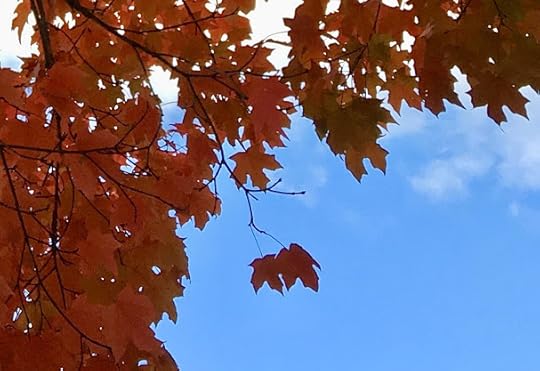
————————————————————————————————————————-
In Memory of a Friend
"He didn't seem like he was depressed and was always smiling. This is shocking" (Anon).
A bright autumn day
colors crisp
sunlight flashing on the windows.
A clear day, blue with painted hues of leaf.
I stood strong and tall
in the breezy wind
and felt life once again
like great power
from my head flowing down through me.
With large strides
I passed over the fields
drinking fountains of expansive air.
And with the red sun playing on my head,
I burst through the door
but her face was bloodless white.
I stopped, and suddenly
the October air froze on my skin.
She searched my face
with a gaze of shiny wet cheeks
and spoke your name,
and this single word
had a weight
that said everything.
Fire arose in my bones
and spread all over me
until it found my eyes.
And the sun flickered in the shadows.
--in memoriam, jp, +october 17, 2005
October 15, 2023
Israel and Palestinian Gaza: The Brink of Full Scale War
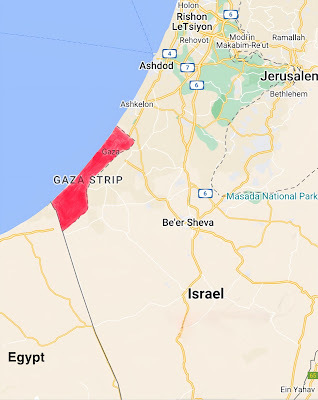 We wait, holding our breath, as Israeli ground forces mobilize on the border of the Palestinian territory of Gaza, an impoverished, desperately overcrowded, chaotic strip of Mediterranean coastline where most of the population of 2.1 million people live a daily struggle for survival. They are hemmed in together behind Israel’s defensive wall in conditions little better than prison—conditions that have arisen in consequence of the failure and breakdown of previous diplomatic agreements for a process leading to a “two-state-solution” to the Israeli-Palestinian conflict. Among the multitudes of innocent civilians are groups of anti-Israel militants who hope to overthrow the State of Israel with help from hostile Islamist neighboring countries and (even) governments. They want all Israeli people to live in fear (including those who have politically opposed the current hard-line government and have actively worked for Palestinian rights); they practice terrorism as a form of jihad (“holy war”), and those who die performing terrorist acts are regarded as “martyrs.” Meanwhile some Israelis would like to drive all Palestinians from the land, and until then impose as many restraints in them as possible. The failure of dialogue between these two peoples has left the field of action bereft of the possibilities for creative and human solutions, and that space has been filled by polarized ideologues who are ready—once again—to place their trust in war. The innocent ones—the Israelis and Palestinians who seek peaceful coexistence, dialogue, real interpersonal and communal solutions—they are the victims and will continue to be the victims as this war escalates.
We wait, holding our breath, as Israeli ground forces mobilize on the border of the Palestinian territory of Gaza, an impoverished, desperately overcrowded, chaotic strip of Mediterranean coastline where most of the population of 2.1 million people live a daily struggle for survival. They are hemmed in together behind Israel’s defensive wall in conditions little better than prison—conditions that have arisen in consequence of the failure and breakdown of previous diplomatic agreements for a process leading to a “two-state-solution” to the Israeli-Palestinian conflict. Among the multitudes of innocent civilians are groups of anti-Israel militants who hope to overthrow the State of Israel with help from hostile Islamist neighboring countries and (even) governments. They want all Israeli people to live in fear (including those who have politically opposed the current hard-line government and have actively worked for Palestinian rights); they practice terrorism as a form of jihad (“holy war”), and those who die performing terrorist acts are regarded as “martyrs.” Meanwhile some Israelis would like to drive all Palestinians from the land, and until then impose as many restraints in them as possible. The failure of dialogue between these two peoples has left the field of action bereft of the possibilities for creative and human solutions, and that space has been filled by polarized ideologues who are ready—once again—to place their trust in war. The innocent ones—the Israelis and Palestinians who seek peaceful coexistence, dialogue, real interpersonal and communal solutions—they are the victims and will continue to be the victims as this war escalates.What can we do? We can stand in solidarity with them. We can pray for them—with real prayer, with the prayer that the Pope calls “the meek and holy force to oppose the diabolical force of hatred, terrorism, and war.” We can also make an offering to God and a gesture of solidarity by fasting. People all over the world will pray and fast for peace on this coming Tuesday, October 17.
Meanwhile, the Pope urges us to continue to remember “tormented Ukraine.” Really, these are not two separate wars. They are related in more ways than we realize. But regardless, we must have hearts and minds that are larger than the trending topics on Twitter/“X”/…whatevah. The suffering of peoples is made known to us in our era by “real time” multimedia. Some follow it as a form of “entertainment” while others feel powerless in front of the weight of all the suffering all over the world, and would prefer not to think about it.
But seeing and hearing about these events can be an opportunity to pray-with and suffer-with our brothers and sisters in distress. It may seem a small thing, but—like a cup of water to the thirsty or a visit to a sick neighbor—it is prayer-in-loving-action, it is a work of mercy. We are human persons. We are not information collectors. We have hearts. Whatever our circumstances, our hearts can unite in begging for God’s mercy, and can reach out to accompany those who are suffering—we can’t “fix” them, but we can draw near to them, even if only in our hearts, so that they do not suffer alone. Our hearts can extend themselves in mercy, and we must beg God to enlarge our hearts. Mercy is the new reality that is building up and transforming our world. We are called to participate in this work, in this mystery of mercy.
Texts from Pope Francis and the assembly of Catholic bishops of the Holy Land:
“I continue to follow what is happening in Israel and Palestine with tears and apprehension: many people killed, others injured. I pray for those families who have seen a feast day transformed into a day of mourning, and I ask that the hostages be released immediately. It is the right of those who are attacked to defend themselves, but I am very concerned about the total siege under which the Palestinians are living in Gaza, where there have also been many innocent victims. Terrorism and extremism do not help reach a solution to the conflict between Israelis and Palestinians, but fuel hatred, violence, revenge, and only cause each to other suffer. The Middle East does not need war, but peace, a peace built on dialogue and the courage of fraternity” (Pope Francis, General Audience, October 11).
“I continue to follow with great sorrow what is happening in Israel and Palestine. I think again of the many… in particular of the children and the elderly. I renew my appeal for the freeing of the hostages and I strongly ask that children, the sick, the elderly, women, and all civilians not be made victims of the conflict. Humanitarian law is to be respected, especially in Gaza, where it is urgent and necessary to ensure humanitarian corridors and to come to the aid of the entire population. Brothers and sisters, already many have died. Please, let no more innocent blood be shed, neither in the Holy Land nor in Ukraine, nor in any other place! Enough! Wars are always a defeat, always!
“Prayer is the meek and holy force to oppose the diabolical force of hatred, terrorism and war. I invite all believers to join with the Church in the Holy Land and to dedicate next Tuesday, 17 October, to prayer and fasting…
“I am looking at the Ukrainian flags: let us not forget tormented Ukraine” (Angelus, October 15).
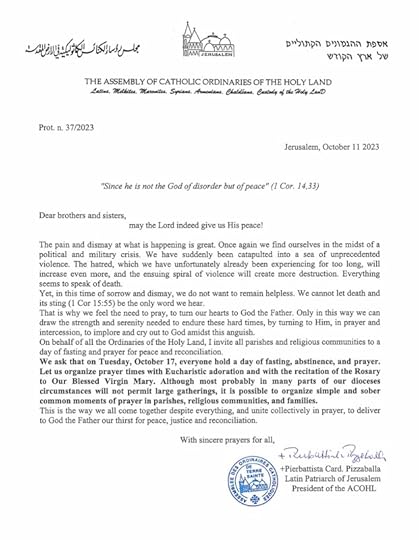
October 13, 2023
A VLOG POST About Autumn, Time, and How We Grow
Here is a short “VLOG POST” from mid-October (filmed 10/13, revised 10/17). Our Shenandoah Valley has begun to “feel” the change of seasons. Sitting along Happy Creek at sunset in mid-October, JJ talks about the season of Autumn… in the year and in his life. Time is given to us to grow and bear fruit.
Here’s the link to “JJProf’s” YouTube channel:
October 10, 2023
Christina Grimmie: “Wear Your Heart Out…”
It has now been seven years and four months since the murder of Christina Grimmie in Orlando, Florida at an open meet-and-greet after what turned out to be her final concert on June 10, 2016. In her honor, I have attempted to create a cartoon meme.
She remains a luminous witness even today to the truth that the Love of God through Jesus Christ is “all [we] need.”

October 9, 2023
A New Outbreak of Terrorism and War in Israel and Palestine
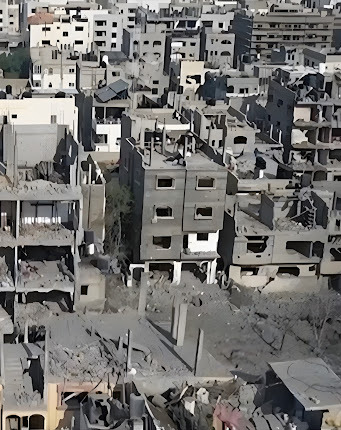 Last Saturday, the Islamic terrorist group Hamas carried out a massive attack on Israeli territory, using advanced technology to disable and breach the wall surrounding Palestinian Gaza and invade Israeli territory to murder hundreds of men, women, and children in Israeli villages. At the same time, rockets were fired from Hamas outposts in Gaza against Israeli targets.
Last Saturday, the Islamic terrorist group Hamas carried out a massive attack on Israeli territory, using advanced technology to disable and breach the wall surrounding Palestinian Gaza and invade Israeli territory to murder hundreds of men, women, and children in Israeli villages. At the same time, rockets were fired from Hamas outposts in Gaza against Israeli targets.Taken totally by surprise, Israel declared war on Hamas and began relentlessly bombing Gaza. The awful fact remains that the barbaric Hamas terrorists are indistinguishable from the rest of the 2+ million civilian inhabitants crowded into the confines of 365 square kilometers of the Eastern Mediterranean shore. Gaza’s Palestinian people—including women, children, and the elderly—are inevitably the victims of an ongoing Israeli bombardment of their region as they try to seek out and destroy Hamas.
The present tragedy is that “war against Hamas” (as an effort of self defense) is indistinguishable in fact from war against the entire population of Gaza. This kind of indiscriminate “total war” is never justifiable and can never bear fruit. The dynamic of the Israeli-Palestinian conflict is a generator for hatred and violence that has passed from generation to generation. It has been a constant feature of world news for my entire life.
I have not so much as a hint for how to resolve these conflicts. War rages in the ancient land that is so specially loved by God, where He began to dwell with the human race and—by the events of His crucifixion and resurrection—won for the human heart an ineradicable destiny of union with Himself. God permits this terrible war, however, foreseeing that it will ultimately lead to a peace that glorifies His mercy.
But my heart finds no consolation, right now, in mere words. I weep for the homeland of Jesus. I mourn the awful deaths of so many of my Jewish, Muslim, and Christian brothers and sisters and the corresponding afflictions brought down upon perpetrators and victims alike.
I weep and pray.
October 7, 2023
An “Ever Closer Union” With Jesus, Through Mary
 “In the Rosary we turn to the Virgin Mary so that she may guide us to an ever closer union with her Son Jesus to bring us into conformity with him, to have his sentiments and to behave like him. Indeed, in the Rosary while we repeat the Hail Mary we meditate on the Mysteries, on the events of Christ’s life, so as to know and love him ever better” (Pope Francis).
“In the Rosary we turn to the Virgin Mary so that she may guide us to an ever closer union with her Son Jesus to bring us into conformity with him, to have his sentiments and to behave like him. Indeed, in the Rosary while we repeat the Hail Mary we meditate on the Mysteries, on the events of Christ’s life, so as to know and love him ever better” (Pope Francis).Feast of Our Lady of the Rosary.
October 5, 2023
“Autumn Evening”
October 4, 2023
The Synod: Learning to “Walk Together”
 The XVI General Assembly of the Synod of Bishops has gathered in Rome after a long process of preparation that entailed meetings of dialogue among bishops, priests, and lay people in dioceses all over the world. It would be too much to generalize and simply say that it was a fruitful experience for the younger churches in Africa, Asia, and Latin America, but a complicated, perplexing, over-structured, and sometimes agenda-driven process for the wealthy churches of Europe and North America. It’s not surprising that some of us in “the West” can be anxious about a process that appears to be intent on “listening to everyone.” We have had over a century of experiences (and reinforcing media narratives) that might well incline us to view all human interaction as a struggle of hyper-partisan power politics. This is not without reason, and indeed points to a potential human dynamic wherein ideologies can “hijack” a well-intentioned dialogue and turn it into an opportunity to sow dissent and confusion while increasing their own power in society.
The XVI General Assembly of the Synod of Bishops has gathered in Rome after a long process of preparation that entailed meetings of dialogue among bishops, priests, and lay people in dioceses all over the world. It would be too much to generalize and simply say that it was a fruitful experience for the younger churches in Africa, Asia, and Latin America, but a complicated, perplexing, over-structured, and sometimes agenda-driven process for the wealthy churches of Europe and North America. It’s not surprising that some of us in “the West” can be anxious about a process that appears to be intent on “listening to everyone.” We have had over a century of experiences (and reinforcing media narratives) that might well incline us to view all human interaction as a struggle of hyper-partisan power politics. This is not without reason, and indeed points to a potential human dynamic wherein ideologies can “hijack” a well-intentioned dialogue and turn it into an opportunity to sow dissent and confusion while increasing their own power in society.Thus, the fears or the expectations of our peoples might easily stand in the way of our perceiving what the event and the grace of this “Synod on Synodality” really is for the whole Church. Pope Francis is pursuing “the synodal path” for reasons entirely different from the preoccupations of the Western media. He believes that this difficult effort is necessary because it is God’s will for the whole Church today, and for the Church’s evangelizing mission in the world. So often we fail to recognize that the Synod is an ecclesial event whose value cannot be measured by this-worldly criteria. Even if it yields nothing that gains our excitement, or appears to be “a failure” in earthly terms, we must not ignore what the Holy Spirit is trying to accomplish—where the Spirit is leading the Church—in these initial and vulnerable steps toward a more profound mutual understanding and compassion among the members of Christ’s Body, a fuller involvement of ourselves in the real possibilities for living in the world today (amidst epochal changes) as brothers and sisters of Christ, and as servants of everyone.
We have too little faith in the fact that Jesus Christ really is the Head of the Church, that He directs the Church in the ways of His redeeming love, and has promised to be with us always in our journey through this present life. But if we listen to Pope Francis with the expectation of recognizing the grace of God at work in him to lead the Church, we would recognize the supernatural value of this Synod with patience and confidence that it will bear fruit. Indeed, the fruits of the Synod are ripening even now.
Pope Francis knows this, and he is dedicated—as “Vicar of Christ” at the present moment in history—to lead the Church’s first new steps in “walking together” and being the light of the world.
We should listen to the Pope’s words (below, in bold type), as he preached in the October 4 opening Mass, in which he reminds us of the gaze of Jesus that defines us, communicates Divine love to us, and challenges us “to be a Church that, with a glad heart, contemplates God's action and discerns the present. And which, amid the sometimes agitated waves of our time, does not lose heart, does not seek ideological loopholes, does not barricade itself behind preconceived notions, does not give in to convenient solutions, does not let the world dictate its agenda. This is the spiritual wisdom of the Church, summarized with serenity by Saint John XXIII: ‘It is necessary first of all that the Church should never depart from the sacred patrimony of truth received from the Fathers. But at the same time she must ever look to the present, to the new conditions and new forms of life introduced into the modern world which have opened new avenues to the Catholic apostolate’ (Address for the Solemn Opening of the Second Vatican Ecumenical Council, October 11, 1962).
“Jesus’ gaze that blesses invites us to be a Church that does not face today’s challenges and problems with a divisive and contentious spirit but, on the contrary, turns its eyes to God who is communion and, with awe and humility, blesses and adores him, recognizing him as its only Lord. We belong to him and — let us remember — we exist only to bring him to the world. As the Apostle Paul told us, we have no other ‘glory except the cross of our Lord Jesus Christ’ (Galatians 6:14). This is enough for us; he is enough for us. We do not want earthly glory; we do not want to make ourselves attractive in the eyes of the world, but to reach out to it with the consolation of the Gospel, to bear witness to God’s infinite love, in a better way and to everyone. Indeed, as Benedict XVI said, precisely when speaking to a synod assembly, ‘the question for us is this: God has spoken, he has truly broken the great silence, he has shown himself, but how can we communicate this reality to the people of today, so that it becomes salvation?’ (XIII General Assembly, October 8, 2012). This is the fundamental question. And this is the primary task of the Synod: to refocus our gaze on God, to be a Church that looks mercifully at humanity. A Church that is united and fraternal — or at least seeks to be united and fraternal — , that listens and dialogues; a Church that blesses and encourages, that helps those who seek the Lord, that lovingly stirs up the indifferent, that opens paths in order to draw people into the beauty of faith. A Church that has God at its center and, therefore, is not divided internally and is never harsh externally. A Church that takes a risk in following Jesus. This is how Jesus wants the Church, his Bride, to be.”
October 2, 2023
A Note on “Grace” and Ancient Chinese Wisdom
 [The Chinese text pictured is the title of Matteo Ricci’s book, “The True Meaning of the Lord of Heaven,” written in Chinese by the great Jesuit missionary, and first published in Beijing in 1603.]
[The Chinese text pictured is the title of Matteo Ricci’s book, “The True Meaning of the Lord of Heaven,” written in Chinese by the great Jesuit missionary, and first published in Beijing in 1603.]One aspect of my East Asian Studies Project involves reading and trying to appreciate more deeply the Chinese Classics and other ancient texts (in English translation, since I don’t know Chinese). In so doing, I cannot engage them otherwise than as a Catholic Christian, thus participating in some small way in a dialogue of great importance.
From time to time, I record some “notes” here, especially on points that have arisen in discussion and efforts of clarification. I have only begun to study these things, so I don’t speak from any personal expertise. I have “impressions” that I am trying to verify as best as I can. Let me therefore present this question in the form of a NOTE: The Confucian emphasis on virtue as self-cultivation seems isolated from any awareness of the need for a relationship with God. How does the Confucian “superior person” resemble and/or differ from the Christian who lives by the Spirit and who “grows in virtue” by cooperating with the grace of God?
This seems like a huge question that involves other related questions. Some may think it’s comparing apples and oranges, but the question arises nevertheless for me as I read these texts, and I want to look at its various aspects, and hope to find at least a more firm orientation for my understanding.
There are many valuable insights in Confucian exhortations to live a humane life, but the realization of such a life seems to be entirely within the reach of human possibilities (and, indeed, restricted to a human scale). I’m far from certain that this is accurate, however. It may be more indicative of a presentation that calls for a full and explicitly developed context for considering human action. Having said that, I think perhaps the lack of a sense of the need for God’s grace may be one of the limitations of the Confucian ethical tradition—there was a similar “absence” in Ancient Greek philosophical ethics, which is why the Greeks had so little hope for the vast majority of ordinary humans to attain virtue.
The Chinese may have been more “optimistic” (Mencius especially) about human nature. They focused on that part of ethics that involves social order, though it extends deeper than “politics.” The Confucian ideal of the sage, the “superior person,” does seem to be self-cultivated(?), but there is also a pervasive emphasis on “the will of Heaven” that I would like to understand more fully.
“The superior person will never suffer calamity, because he realizes that nothing is a calamity” (Mencius). I think Mencius is trying to say that everything has meaning—even that which we experience as suffering—when we are conformed (?) to the “will of Heaven” which orders all things. What does that mean? What is the intuition here, and what are its possibilities? There’s a lot of emphasis in ancient Confucian tradition to adherence to what has been “given” (to the point that, as the tradition develops, the “roles” in society become rigid and the place of interpersonal dialogue in the service of benevolence and harmony gets minimized). I don’t know if it goes any further than that, or what might be suggested in the aphorisms and dialogue format which convey these teachings.
I am trying to appreciate the inherent “openness” of some of these classical Chinese philosophers who didn’t have the ambition to “explain everything” (the systematizing came later) and left transcendent truth in the mode of an “open question.” This was a quality that deeply impressed Matteo Ricci and the early Jesuits, and it appears also in their Mandarin followers (especially in the converts who are known as the “Three Pillars” of the Catholic Church in “modern” [i.e. post 1600] China: Xu Guangqi, Li Zhizao, and Yang Tingyun). It also appears in the remarkable “founders” of the Church in Korea. It was Korean scholar-officials of the Confucian tradition who first encountered Christ through the Jesuits they met during diplomatic visits to Beijing. A few were baptized, and they returned to Korea and brought others to conversion so that there were 4000 baptized Christians by the time the first European missionaries came.
I think perhaps the traditional wisdoms in East Asia were “open to grace” in ways we haven’t appreciated (or were in part efforts to articulate the movement of grace already at work within them, as it was among “the Gentiles” before the coming of Christ, and presumably continues to be [according to the mysterious working of the Holy Spirit] among those after Christ who have not yet had a decisive encounter with Him).
After initial missionary efforts and sometimes striking success, the Church in East Asia has been hindered and persecuted mostly for political reasons (modern European colonial ambitions didn’t help). Otherwise, the Church might have grown much more widely in the 17th-18th centuries. God willing, it will grow now and in the future wherever it has the freedom to do so. Great 20th century Chinese Catholic converts like John C. H. Wu challenge us to appreciate the ways that Jesus will transform, revivify, and fulfill East Asian traditions. (I have written about Dr. Wu elsewhere; see this LINK.)
October 1, 2023
Saint Thérèse in “Color”?
Sunday took liturgical precedence over Saint Thérèse of Lisieux’s October 1 feast this year. But we still remember her and honor her. When she speaks like this, what can I say other than 😮⁉️
“Yes, in order that Love be fully satisfied, it is necessary that it lower itself, and that it lower itself to nothingness and transform this nothingness into fire" (Saint Thérèse).
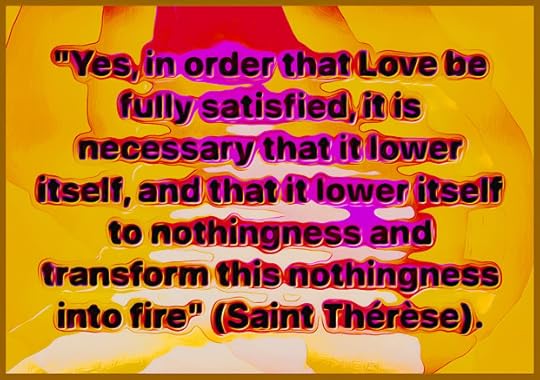
Here are more astonishing and mysterious words from Thérèse, as she lay dying in agony from tuberculosis in 1897. How could this be possible?
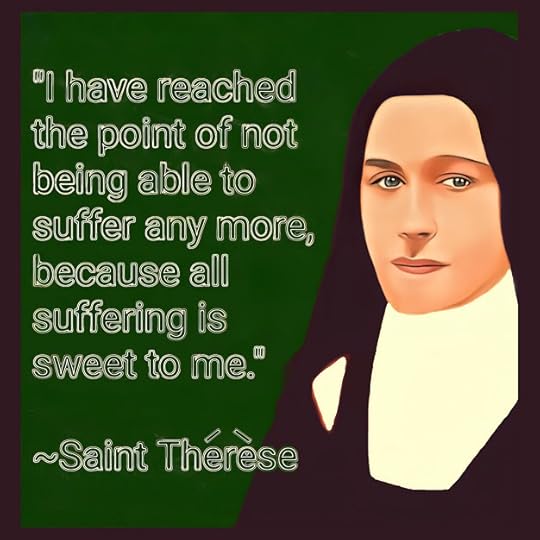
And, of course, you’ve seen the famous black&white photo of Saint Thérèse as a girl of 15. Well, I used some basic digital tools and a bit of work and I got THIS result. I cannot guarantee that she “really” looked like that, since I had no information regarding the precise colors (eyes, hair, skin tone), but perhaps it gives us some idea of how she looked, or a more striking impression of her being a *real human being* of a relatively recent time (January 2, 1873 — September 30, 1897). Wow!





